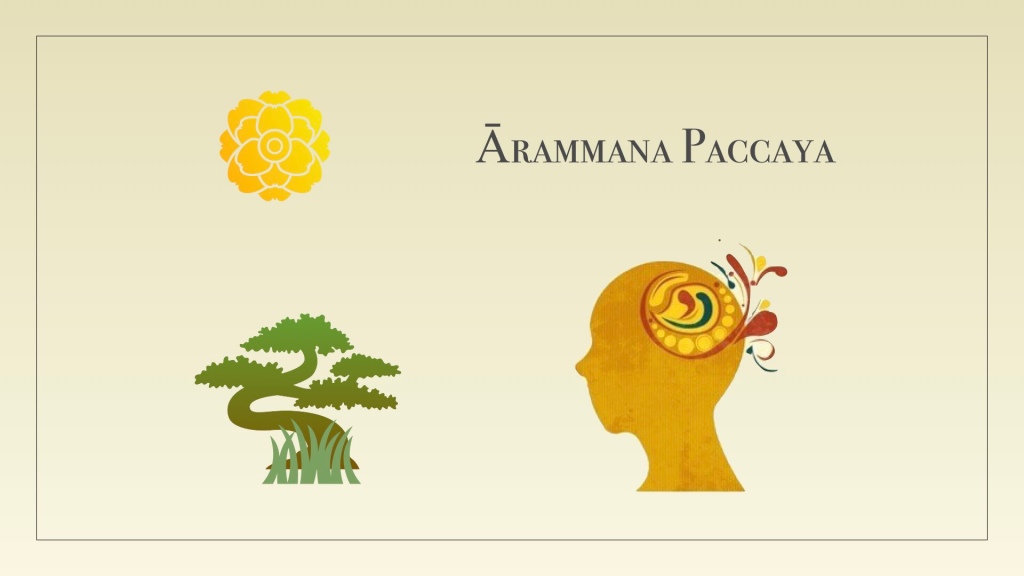
Ārammana, usually translated as objects, may more accurately be thought of as supports of the mind (and the senses).
Thus, this condition is describing any relation between mind or matter (as in the case of sense-base matter) and an supporting object.
Any consideration wherein “my house”, “my country”, “my friends”, “my relatives”, “my property” etc. is the central theme of the consideration, is a condition of mind and matter under this Paṭṭhāna condition of objects.
An object in regard to the mind, means any kind of support for the mind, thus both concrete objects, as well as subjects or conceptual ideas the mind is pondering upon. And so will considerations such as “my views”, “my beliefs” or “my tradition” come in equal amount under this condition.
Yet, for gaining a better comprehension of objects following our previous scheme, we again may at first class them in line with the four elements. So will material objects be taken as an expression of the earth element. Objects of affection may be classed as belonging to the water element. Objects of hatred or aversion are classed under fire element. And objects of a subtle and spiritual kind will be taken as expressions of the air element.
But then under the categories of mind and matter, we may be able to go deeper in our considerations.
Thus, the outer world and outer events and conditions are the objects of the senses, and through percept turn into objects of the mind. These objects which the mind then starts to consider in turn will support the mind and modify the functioning of consciousness. Thus can a consideration as “my house”, “my family”, “my bank account” or “my tradition” indeed stabilise a mind which is only concerned with the sense-sphere world.
So we can classify objects or supports in relation to the spheres of consciousness into three broad categories. First, there are sense-sphere objects, some of which are mentioned above. That is, things and ideas of ourselves and our environment. Who we are (in a sense-sphere sense), what we should do, what will be the (physical) outcome of our actions, etc.. The second category of objects or supports of mind, are subtle or fine-material objects. Examples of which are energy, subtle feelings and mental perceptions of a fine-material kind, but it too will be ideas, which relate to the development of the mind into these regions which are higher than the world of the senses. Usually such perceptions begin only to arise when the mind becomes capable of being stabilised by religious or philosophical or philanthropical ideas. That is, ideas which relate to making the mind or person more noble and perfect. Examples of this are ideas about saintly people or more perfected beings above, aspirations for world peace or ideas about unconditional love or goodness. These then together with the various perceptions that arise based on them will then be the supports which stabilise the mind.
The third category of objects relate to immaterial things. This contains all objects, which are so to say abstracted from matter. Considerations of a scientific character, mathematical questions, ideas about the conditions of particles or of consciousness etc. fall into this category of objects.
In the first of the above cases, the objects of consciousness will be ever changing, because the material world is only to a very limited degree controllable. Thus there will be continuously alternating feelings of pleasure and pain. And following that, will for a consciousness rooted in the senses, the mind continuously alternate between wholesome and unwholesome considerations.
But in the second case, the mind itself will continuously seek to condition the feelings through the use of higher ideas and broader considerations. The mind will not accept material objects as a support, rather only subtler feelings alternate with higher ideas and loftier considerations as the supports for consciousness. Each conditioning the other and supporting the other.
In the last case, that of immaterial supports for the mind, they can only really support the mind, when the feelings have become so refined as to be imperceptible to the mind, while the consciousness itself must equally have become so refined as to be supportable entirely by mind-objects.

[…] Snippet from “Ārammaṇa Paccaya – Condition of Objects” article via https://amonksselflessmagic.wordpress.com/2020/08/01/arammaṇa-paccaya-condition-of-objects/ […]